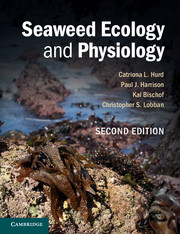Book contents
- Frontmatter
- Dedication
- Contents
- List of contributors
- Preface
- 1 Seaweed thalli and cells
- 2 Life histories, reproduction, and morphogenesis
- 3 Seaweed communities
- 4 Biotic interactions
- 5 Light and photosynthesis
- 6 Nutrients
- 7 Physico-chemical factors as environmental stressors in seaweed biology
- 8 Water motion
- 9 Pollution
- 10 Seaweed mariculture
- References
- Subject Index
Preface
Published online by Cambridge University Press: 05 August 2014
- Frontmatter
- Dedication
- Contents
- List of contributors
- Preface
- 1 Seaweed thalli and cells
- 2 Life histories, reproduction, and morphogenesis
- 3 Seaweed communities
- 4 Biotic interactions
- 5 Light and photosynthesis
- 6 Nutrients
- 7 Physico-chemical factors as environmental stressors in seaweed biology
- 8 Water motion
- 9 Pollution
- 10 Seaweed mariculture
- References
- Subject Index
Summary
There have been very significant advances in many areas of phycology since the last edition nearly 20 years ago. In particular, the advances in our understanding of the endosymbiotic origin of algal plastids, and molecular aspects and genetics, stand out. The wealth of new literature alone in all the areas has warranted adding two new co-authors, Catriona Hurd, who focuses on water motion and seaweed physiological ecology, especially in the southern hemisphere, and Kai Bischof, who is well known for his research on photobiology and stress physiology. Hence, the previous edition’s chapter on “Temperature and salinity” has been expanded to include other environmental stressors such as UV radiation, ocean acidification, oxidative stress responses and the interactions between stressors.
Seaweed Ecology and Physiology is a textbook for senior undergraduates and a reference book for researchers. The rapid growth of knowledge in this field is both exciting and daunting. Our goal was to select papers that help put together a coherent story on a wide variety of ecological and physiological aspects. This book provides an entry to the literature, not a systematic literature review. With two of our co-authors having experience in the tropics and the temperate southern hemisphere, we have tried to avoid the typical temperate northern hemisphere bias.
- Type
- Chapter
- Information
- Seaweed Ecology and Physiology , pp. xiii - xivPublisher: Cambridge University PressPrint publication year: 2014



